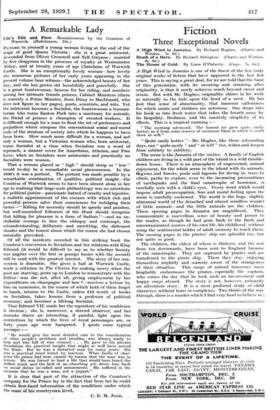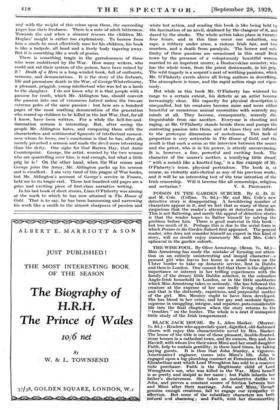Fiction
Three Exceptional Novels
The House of Gold. By Liam O'Flaherty. (Cape. 7s. 6ti.) A High Wind in Jamaica is one of the finest of the few truly original works of fiction that have appeared in the last few years. This is saying a great deal, for we are told that the bane of this generation, with its sweating and straining after originality, is that it rarely achieves much beyond sweat and strain. But with Mr. Hughes, originality shines in his work as naturally as the halo upon the head of a saint. He has just that sense of abnormality, that innocent callousness for which saints and children are notorious. One drops into his book as into fresh water that takes the breath away by its limpidity, freshness, and the masterly simplicity of its effects. This is a tropical morning :- " The morning advanced. The heated air grew " Quite easily hotter "—Mr. Hughes, like those astounding days, can " quite easily and " at will " rise, widen and deepen from subtlety to subtlety. The scene is the:Jamaica of the 'sixties. A family of English children are living in a wild part of the island in a wild tumble- down house. There is an atmosphere of ungoverned, animal enjoyment, for the whole scene in the island with its animals, itegroes and forests, pools and lagoons for diving in, trees to climb, paths to explore, even to the increasing premonitions of earthquake and the final catastrophe of hurricane, is carefully seen with a child's eyes. Every word which would impose adult preoccupation, fear and moral feeling upon the scene is carefully eschewed. The world is the huge, slightly abnormal world of the detached and almost mindless wonder of little animals—and the little animals are the children. These opening pages in Jamaica are magnificent. They communicate a marvellous sense of beauty and power to the reader, as though he had gone back to the fresh and uncontaminated sources of his own life, his childhood, without using the sentimental ladder of adult memory to reach them. The ensuing pages in the pirates' ship are splendid too, but not quite so good. The children, the eldest of whom is thirteen, and the rest from ten downwards, have been sent to England because of the catastrophe. They are captured by pirates and are transferred to the pirate ship. There they stay, enjoying themselves mightily and scarcely aware of the strangeness of their situation. This cargo of animal innocence most laughably embarrasses the pirates, especially the captain, who curses the day that he took such an inconvenient and happy cargo aboard. The story is not, however, primarily an adventure story. It is a most profound study of child character, without tears or complexes. Two thirds of the way through, there is a murder which I find very hard to believe in ; ansi with the weight of this crime upon them, the succeeding pages lose their freshness. There is a note of adult bitterness: Towards the end when a steamer rescues the children Mr. Hughes' insight is rather too explanatory. To borrow from him a simile he most effectively uses for-his children, his book is like a tadpole, all head and a lively body tapering away. But it is something like a work of genius. • There is something tragic in the garrulousness of those who were embittered by the War. - How many writers, who could not rid their system of the poison, have been ruined by it ! Death of a Hero is a long-winded book, full of outbursts, sermons, and denunciations. It is the story of the forbears,. life and premature death in the War, of George Winterbourne, a pleasant, priggish, young intellectual who was led as a lamb to the slaughter. I do not know why it is that people with a passion for truth, which Mr.' Aldington has, should convert the passion into one of venomous hatred unless the two are extreme poles of the same passion : but here are a hundred pagei of the most scathing denunciation of the generation who reared up children to be killed in the last War, that, for all I know, have been written. For a while the hell-fire-and- damnation sermon is interesting. But, after seeing the people Mr. Aldington hates, and comparing them with the characterless and sentimental figments of intellectual earnest- ness whom he loves, one's conclusion is that. he has, after all, merely preached a sermon and Made the devil more interesting than the deity. One sighs for that Barren Hay, that Antic Counterpoint. George, the artist, worried by the two women who are quarrelling over him, is real enough, but what a little prig he is ! On the other hand, when the War comes and George joins the Army, .Mr. Aldington packs up his sermon and is excellent. I am very tired of this plague of War books, but Mr. Aldington's account of George's service in France, held me to its tragic end. Those last hundred odd pages are a grim and exciting piece of first-class narrative writing. In his last book of short stories, Liam O'Flaherty was aiming at the mark to which he has now attained in The House of Gold. That is to say, he has been hammering and narrowing his work like a smith to the utmost sharpness of passion and white hot action, and reading this book is like being held by the fascination of an anvil, deafened by the clangour of it, and dazed by the smoke. The whole action takes place in twenty, four hours, and in this time occur one seduction, one rape, a robbery under arms, a riotous Irish fair, and two murders, and a death from paralyiii: rThelorior and sub: 'unity of- these passions are occasioned in this small Irish town by the presence of a voluptuously beautiful woman married to an impotent usurer, a Dostoevskian monster, who has the whole town, from the prieit doNinwards, in his krip. The wild tragedy is a serpent's nest of writhing pluiSiOns, which Mr. O'Flaherty excels above all living authors in describing. The atmosphere is tense, and the rapid action rings out vigor- ously. But while in this book Mr. O'Flaherty has widened his range to a certain extent, his defects as an artist become increasingly clear. His capacity for physical descriptiOn is unequalled, but his creatures become more and more either beautiful of monstrous animal enormities with scarcely any minds at all. They become, conseqUently, scarcely dis- tinguishable from one another. Everyone is shouting and raging, as Mr. O'Flaherty stands beside them and pumps the Contorting passion into them, and at times they are inflated to the grotesque dimensions of melodrama. This lick of proportion is very noticeable in The House of Gotd, and the result is that such a scene as the interview between the usurer and the priest, who is in his power, is utterly unconvincing. It is, however, a fine, powerful and exciting book. The character of the usurer's mother, a terrifying little dwarf, " with a mouth like a knotted bag," is a fine example of Mr. O'Flaherty's tense, physical portraiture. The book is, of course, as violently anti-clerical as any of his previous. works, and it will be an interesting test of the trim intention of the Irish censorship. Will it become like all censorships, religious



































 Previous page
Previous page